More Middle-earth, and Even More Narnia?
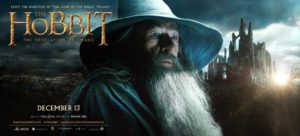 The second of two trailers for The Hobbit: The Desolation of Smaug arrived this morning. For the first time, I’m embedding it here and even tentatively extolling its awesomeness without having actually seen it. So far I’ve also successfully avoided trailer spoilers.1
The second of two trailers for The Hobbit: The Desolation of Smaug arrived this morning. For the first time, I’m embedding it here and even tentatively extolling its awesomeness without having actually seen it. So far I’ve also successfully avoided trailer spoilers.1
Yes, marriage is a great thing, particularly marriage to a woman whose Tolkien fandom is double the years of your own. So it’s far better for us to view Middle-earth trailers together.
So, presumably, it’s a good day to be a fantasy fan, yet not only because of The Hobbit 2.Also, this just in from NarniaWeb, where I’m still a Moderator Emeritus:23
This morning the official Narnia Twitter and Facebook accounts announced that the Mark Gordon Company will produce the next the next Narnia movie: The Silver Chair.
They link to this tweet:
Breaking news Narnia fans– #Oscar-nominee Mark Gordon to produce next #Narnia movie. #SilverChair. pic.twitter.com/hz4l6JFNLM
— Official Narnia (@OfficialNarnia) October 1, 2013
NarniaWeb news poster “Tirian,” the site’s founder, reminds readers that an actual film could be years away, especially if former Narnia rights-owner Walden Media isn’t involved.
ComingSoon.net later updated with a fuller article, including quotes from Chronicles of Narnia author C.S. Lewis’s stepson and estate shepherd, Douglas Gresham, and newcomer producer Mark Gordon himself.
Mark Gordon stated, “Like many readers, both young and old, I am a huge fan of C.S. Lewis’s beautiful and allegorical world of Narnia. These fantasy stories inspire real-world passion among millions of devoted fans around the world. As we prepare to bring the next book to life, we are humbled and excited to contribute to the outstanding legacy of Narnia.”
Douglas Gresham, stepson of C.S. Lewis[,] stated, “I have a great deal of respect for Mark Gordon’s work and am confident that together we can bring the beauty and magical delight that Narnia engenders in the hearts of those who read the books to the screen in ‘The Silver Chair.’ I am very much looking forward to diving once more into Narnia, this time with Mark Gordon and his team.”
Mark Gordon and Douglas Gresham along with Vincent Sieber, the LA based Director of The C.S. Lewis Company, will serve as producers and work with The Mark Gordon Company on developing the script. Michele Wolkoff and Sara Smith will oversee for The Mark Gordon Company.
Disney co-produced the first two films — The Lion, the Witch and the Wardrobe in 2005 and Prince Caspian in 2008 — before dropping out of a third. 20th Century Fox picked up The Voyage of the Dawn Treader, which released in 2010 (with a post-converted 3D version).
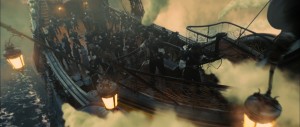
If you see Evil Green Mist™ in Dawn Treader, people are about to be tempted not to follow their hearts.
And Dawn Treader was awful.4 It was awful as a standalone film, but it was especially awful as an adaptation of Lewis’s third Narnia chronicle. Where the story focused on episodic adventures on a variety of islands, all on a single voyage to the end of the world and Aslan’s country — the one place worth giving anything to see — the movie mutated this into yet another video-game-style quest to collect Items and lame “spiritual” journey of self-discovery. Like the converted 3D version, it was an attempt to make shallow things look deep. Neither false-deepening was effective.
So will a new producer and team-up make a better Narnia film? I’m cautiously opti — no. I’m only cautious. And I’m a little more cautious because of Gordon’s quote, in which he refers to “C.S. Lewis’s beautiful and allegorical world of Narnia” (emphasis added).
Mr. Gordon: Don’t do that. No. Really, don’t. Really. Don’t.
What do you hope from a fourth Narnia film, if any film at all? And what did you think of the second Desolation of Smaug trailer?5
- Note: Internet difficulties have beset SpecFaith editor and regular Monday columnist Rebecca LuElla Miller. Please pray for her connection to be restored soon. ↩
- Because “once a mod or moddess on NarniaWeb, always a mod or moddess on NarniaWeb. ↩
- Also: I met said Tolkien-fan wife on NarniaWeb, talking about predestination and free will. True story. ↩
- See Fighting Man-Centered Monsters in Christian Fantasy, Dec. 16, 2010, and Defeating Man-Centered Monsters with Greater Stories, Dec. 23, 2010. ↩
- I’ll actually read any comments about the latter only after about 7 p.m. Eastern Daylight Time. ↩
































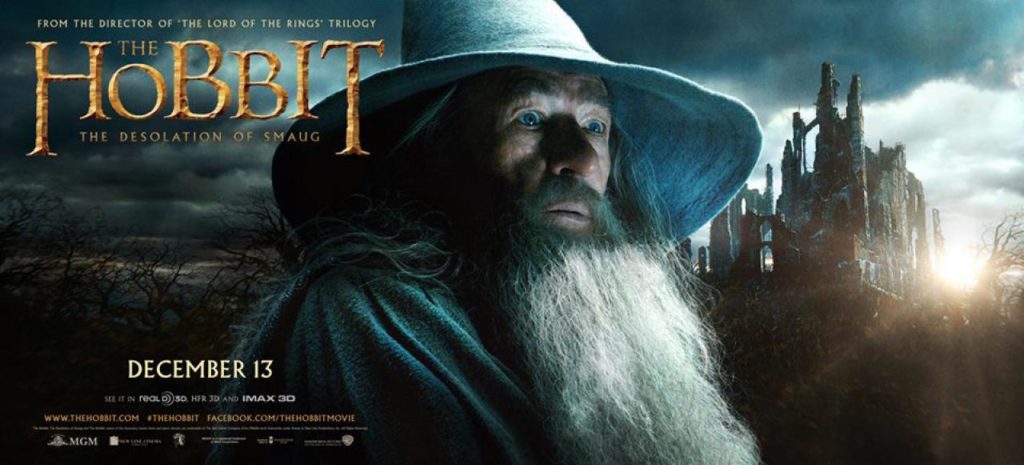



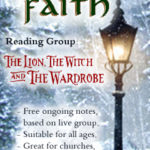

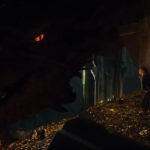



The DoS trailer looked really cool, though I am still concerned about Tauriel.
I think The Silver Chair would make a great film–the BBC version is good for its day, especially with Tom Baker as Puddleglum. Yeah, “allegorical” is a bit unsettling term.
I’m finally getting slightly excited about Desolation. The first trailor was mostly just an overlong mishmash of CGI landscapes. At least this trailor has a sense of story to it.
It’s unclear to me why you find Gordon’s use of the word “allegorical” unsettling. If The Chronicles of Narnia isn’t allegory, then what is?
I love fantasy and loathe allegory. The difference? The plot of allegory is always subservient to the moral, even to the point of gaping holes of logic – whereas good fantasy conforms to the canon of ‘willing suspension of disbelief’, thus doesn’t have gaping plotholes or inexplicable irrational behaviour on the part of the characters. That, in my experience, is the prime difference when it comes to the page.
What you’re referring to is bad allegory. Allegory itself is not, as I recall, generally defined as “a story containing gaping plot-holes, irrational character behavior, and a plot that’s subservient to the intended message.” The New Oxford American Dictionary defines “allegory” to mean “a story, poem, or picture that can be interpreted to reveal a hidden meaning, typically a moral or political one.” That’s a pretty broad definition, and one which comfortably — and unquestionably, in the case of The Lion, the Witch, and the Wardrobe — fits The Chronicles of Narnia.
Yes, allegory typically lends itself to those problems you’ve pointed out. But that doesn’t mean its a useless or artless literary form. Lewis is generally acknowledged to have composed some of the best allegorical works in Christian literature. The shortcomings of his subsequent imitators shouldn’t impel us to strike an entire technique from our list of acceptable practices, or shudder when people refer to its use in his works.
You’re absolutely right that it’s bad allegory, though I struggle to think of any allegory that it doesn’t fit. Is it the hiddenness of the meaning that defines allegory? I struggle with that, too. On the one hand I can think of heaps of poems that I would never consider allegorical but have hidden meanings. On the other hand, classic allegory like Pilgrim’s Progress hardly hides its moral when names are as transparent as ‘Slough of Despond’.
I think your struggle might be due to an all-or-nothing definition of allegory. It comes in different degrees. A story doesn’t have to be a direct allegory — the most extreme form, in which practically everything has a real-world analog — to be merely allegorical. Yes, Pilgrim’s Progress is the most famous example of a direct allegory, but a narrative doesn’t require neat labeling to count as one. Ted Dekker’s Showdown and Circle Trilogy — his best works before that lamentable slide into weird, creepy mediocrity — are stellar, even moving examples. Frank Peretti’s The Oath is another. These aren’t the kind of cynical, shoddy “message novels” you so rightly loathe. They’re thrilling, imaginative, and thematically deep. They’re allegory pushed toward its full potential.
Supposal.
Of course the Chronicles include allegorical elements, just as Tolkien’s Middle-earth novels and legendarium includes linguistics. But I would say Narnia isn’t “allegory” just as a Tolkien novel is not “a linguistics study.”
I think we’re using different definitions of the word. You’re probably referring to a strict interpretation of direct allegory (in which every fictional element must represent something in the real world), while I’m employing a broader interpretation of “allegory” to include both its direct and indirect forms (i.e. while Aslan is a type of Christ, Puddleglum doesn’t necessarily “represent” anything or anyone specific). Until I see evidence to the contrary, I’m willing to believe Mark Gordon intended the word in that latter sense.
Fair enough. As you might guess, I’m more sensitive to the confusion of categories, as you mentioned. People think fiction only counts for something if every character and/or element “stands for” something overtly spiritual.
After Dawn Treader, I was hoping they’d just stop. The Silver Chair is kind of freaky and surreal anyway–the BBC version did a fantastic job with it–and I shudder to think what garbage they’ll do to it in Hollywood. I wish they’d just do the Horse and his Boy and leave it at that. It’d be very Arabian Nights.
I’m enjoying the Hobbit movies, and I can’t wait to see Smaug Cumberbatch. That’s one book I don’t mind getting the Epic Movie treatment. At least Peter Jackson sticks to the plot, even if he does jazz it up quite a bit. And really, there’s a lot of leeway in “they walked for days through Mirkwood and it was dark and creepy and then they ran out of food”.
I was burned by the Dawn Treader movie pretty hard, and I’m not sure that I’d pay money to see Silver Chair. The changes to the Prince Caspian movie made some sense, but what happened to Dawn Treader was unbelievable. It’s the second or third most popular book: they pretty much had it served up to them on a platter, and the best they could do was to completely screw it over. I prefer to pretend that it doesn’t exist, like that fifth Star Trek movie that also doesn’t exist in my head.
And I haven’t seen Tom Baker as Puddleglum yet, which is a sad spot in my nerd-shaped heart.
It’s on Youtube. You simply must go see it!
I haven’t seen the Dawn Treader yet and I’m not sure I really want to. I understood why they made the changes to Prince Caspian–the liberation of Narnia part is pretty trippy in the book, with people getting turned into animals and trees and stuff–but Dawn Treader you’d think would have been easy! The BBC one is really good. Cheesy effects aside, of course, but at least they stuck to the story.
I had no idea Tom Baker was Puddleglum. I’m going to have to watch the BBC Silver Chair again. 🙂 🙂
I always thought they did a decent job with Treader. That book out of all of them is probably the hardest to film because the structure is so episodic and pre-modern. You’d have to make a miniseries to do it justice. I thought Caspian was worse because they pointlessly junked most of the book in exchange for something worse. Walden has a very bad habit of this, and that’s why films like the Golden Compass and The Seeker bombed.
The Silver Chair is going to be tough. I think it’s one of the best Narnia books, but it relies so much on a certain mood that could easily be destroyed if adapted poorly.
No comment on the Hobbit.
Finally last night I watched the trailer with m’lady.
PROS: Bilbo’s opening lines, direct from the book; fantastic visuals, and of course, narration direct from Cumber-Smaug the Terrible.
CONS: Tauriel. Sorry, folks. And this could be another “OMG Galadriel flirts with Gandalf in the trailer”-style moment. (Relax, people, she’s married, and this is just one Middle-earth ancient showing friendly affection for another.) But it sounds like a forced Wuv Story, whose only benefit is that it involves a manufactured female lead. Still, this is the same movie-Legolas, and the ending is predictable.
SPOILER, if I even need to say it:
In the Battle of Five Armies, Tauriel has a heroinic tragic death.
I think it’s great that Legolas has been given a substantial role in the film and, yes, even a love interest. His inclusion was always inevitable, what with his being the son of Thranduil and all, and I’d much rather that Peter Jackson make use of preexisting character resources instead of teleporting people halfway across Middle-earth on a whim like he did with Elrond and the Elves of Lothlorien in Rings and with Radagast in Unexpected Journey. What I don’t appreciate about Legolas’ romance is that it appears to be a regurgitation of PJ’s ill-conceived Elrond/Arwen/Aragorn love triangle. I mean, seriously. If I have to watch another overprotective, manipulative, meddlesome Elf-lord lecture his offspring over their duty to the family name, I may puke.
Didn’t CS Lewis categorically state that Narnia was not allegory, and that he disliked allegory?
I think he called it ‘suppositional’.
Yes, but as even the comprehensive and supportive-of-your-position article I’ve linked below points out, “supposal” is a term Lewis “invented himself to suit his purposes.” It doesn’t exist in the dictionary. For all intents and purposes, Narnia conforms to a modern definition of “allegory.” Many — sometimes the majority — of its characters, objects, and situations are clearly intended to be understood as Biblical analogs. I’m aware that Lewis wasn’t overly fond of the term, but it seems that had more to do with its associations than its actual meaning.
http://thinklings.org/posts/why-narnia-is-not-allegory